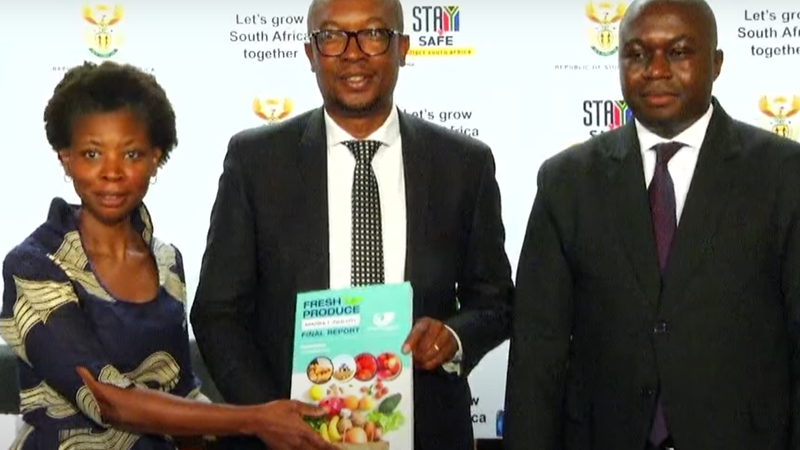Business
Fresh Produce Market Inquiry – Commission makes 31 recommendations─── 11:23 Mon, 13 Jan 2025

The Competition Commission of South Africa has released the final report regarding its Fresh Produce Market Inquiry.
Speaking at a briefing in Pretoria, Commissioner Doris Tshepe, introduced the report as a landmark event, shedding light on critical issues within the agricultural value chain. She emphasised the inquiry’s role in promoting transparency, equity, and competition in this vital sector.
“Essential foods, including fresh fruits and vegetables, are not only vital for food security but also disproportionately impact low-income households, where they represent a significant portion of expenditure.”
The inquiry was initiated following complaints about anti-competitive practices in the fresh produce value chain. A 2020 concentration study revealed high levels of market concentration in the agricultural sector, raising concerns about potential anti-competitive behaviour. Additionally, the Commission’s food price monitoring reports since 2020 pointed to alarming price increases and volatility in fresh produce markets, often surpassing inflation and affecting the nation’s poorest consumers.
Deputy Commissioner Hardin Ratshisusu said the report was a comprehensive analysis of the structural features and practices within the fresh produce value chain.
The inquiry examined five key fruits – apples, oranges, soft citrus, bananas, pears, and table grapes – and six staple vegetables – potatoes, onions, carrots, cabbage, tomatoes, and spinach. These products are considered essential to South African consumers and represent a significant portion of household food expenditure.
The assessment was conducted under three core themes:
- Efficiency of the value chain: Investigating operational dynamics within fresh produce market facilities.
- Market dynamics of inputs: Evaluating the impact of key agricultural inputs, such as fertiliser, agrochemicals, and seeds, on producers.
- Barriers to entry and participation: Identifying challenges hindering the participation and growth of smaller players and historically disadvantaged farmers.
Methodology and engagement
The inquiry employed an exhaustive process to ensure inclusivity and accuracy. It began with consultations on the inquiry’s scope and progressed through targeted information requests, public hearings, and workshops. Stakeholders were invited to provide submissions and feedback on the provisional findings and remedies, culminating in the publication of the provisional report in June 2024.
“This final report reflects the rigorous analysis of submissions and extensive engagements with stakeholders,” Ratshisusu stated.
The inquiry identified structural inefficiencies and anti-competitive practices within the fresh produce value chain. Specific concerns include market concentration, pricing volatility, and limited access for small-scale farmers and market agents. High input costs, including fertilisers and seeds, were also highlighted as significant challenges impacting producers.
Recommendations and path forward
The report outlines targeted remedies to address inefficiencies, foster equitable market participation, and enhance the competitiveness of South Africa’s fresh produce markets.
“Our work has provided a foundation for critical interventions that will benefit both producers and consumers, ensuring a more inclusive and efficient fresh produce sector.”
The findings and recommendations will now be reviewed by policymakers and industry stakeholders, marking an important step toward improving competition and sustainability within South Africa’s agricultural sector.
The agricultural sector is a cornerstone of South Africa’s economy, contributing roughly 2% to the GDP over the past decade and employing approximately 935,000 workers, or 5% of the national workforce, according to 2024 third-quarter statistics.
Tshepe highlighted the sector’s potential for job creation, small and medium enterprise (SME) development, and inclusive growth, all aligned with the government’s objectives.
Trade and Industry Minister Parks Tau officially received the Competition Commission’s final report, hailing it as a significant step toward economic transformation and food security.
“The fresh produce market is more than just a commercial sector; it is a lifeline for households, a source of livelihoods for farmers, and a driver of food security,” Tau remarked. With an annual value of R53 billion in the domestic market alone, excluding exports, the sector holds immense potential for economic growth and equity.
The 31 actionable remedies included enhancing the efficiency of fresh produce markets; reducing barriers to entry for small-scale and historically disadvantaged farmers; and supporting the revitalisation of the local fertiliser industry.
A call for collaboration
Acknowledging the scale of the task, Tau emphasised the need for collective action: “Transforming the fresh produce value chain will require collaboration across the public and private sectors, as well as robust engagement with communities and stakeholders.”
He also confirmed his commitment to tabling the report in Parliament, as required by the Competition Act, to ensure its recommendations receive the attention they deserve within prescribed time frames.
“This report is a call to action,” Tau concluded. “It is an opportune moment to build a fresh produce sector that serves as a beacon of transformation and equal opportunity. I look forward to the collaborative efforts that will ensure its full implementation.”
OFM News dg













